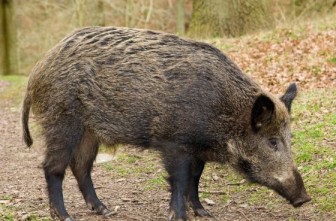
Wild swine. Image: Michigan Department of Natural Resources
A 1905 story on the price of shipping guinea pigs found currency in a present-day Michigan Court of Appeals decision that the state’s Russian boar ban is constitutional.
The appellate court on Wednesday overturned a Marquette Circuit Court injunction in a 3-0 decision that now allows state officials to prohibit people from owning Russian boars. The ban targets companies selling the opportunity for hunters to shoot the hogs that can weigh as much as 450 pounds.
The opinion authored by Judge Elizabeth L. Gleicher refers to a story by Ellis Parker Butler about a railroad agent who charged the livestock rate for shipping two guinea pigs rather than the cheaper rate for domestic pets.
Gleicher said the boar case presents a similar “21st Century pig/rule problem.”
The decision that went against Bear Mountain L.L.C. in Marquette, Michigan, follows multiple requests by farm, environmental and natural resource organizations to manage the state’s wild boar problem.
The Department of Natural Resources (DNR) responded in 2011 by adding the Russian boar and related hybrids to Michigan’s list of invasive species, prohibiting possession of those animals.
Yesterday’s decision solidifies the DNR’s authority to implement this Invasive Species Order.
“It’s a big win for Michigan,” said Ed Golder, public information officer at the Michigan DNR. “This decision is a strong affirmation of the DNR’s policy regarding the Invasive Species Order.”
The agency reports that wild boar “escape, breed vigorously, spread disease, eat crops, defecate in lakes, and generally cause ecological mayhem.”
As the result of a 2012 lawsuit by another boar owner, DNR officials identified nine “specific physical, biochemical, or behavioral characteristics” to define invasive boar.
Bear Mountain and others opposed the classification as lacking a sound scientific basis and that puts domestic swine with similar characteristics at risk for prosecution.
Bear Mountain attorney Glenn Smith said that the order is still in dispute and must be reviewed by local courts to decide whether the boars are wild.
“It’s proved to be constitutional,” but the boar owners “must prove the animals do not violate the Invasive Species Order,” he said.
Boar owners did not dispute the environmental threat posed by wild boars, but they insisted their animals are not “wild” and therefore do not fall within the specifications of the order.
Three related Marquette Country cases were consolidated for the decision.
Boar owners said that “all pigs, regardless of breed or nickname, are one and the same species and all are descended from one and the same ancestor, the eurasian wild boar.”
The DNR argued that, “A Russian boar inside a fence does not become a different species when it escapes or is released and becomes wild.”
The Appeals Court called the Bear Mountain boar owners “highly responsible,” but noted that all Russian boars inhabiting state land were originally penned animals.
The Michigan DNR reports 340 feral swine spotted in Michigan since 2011, and 286 of the boar have been reported killed. The Michigan population is estimated between 1,000 and 3,000 animals.
Golder said the DNR will review the opinion before taking action.
And as far as that 1905 story about shipping guinea pigs on railroads? Gleicher wrote that this is how it ends:
“Rather than pay a rate he viewed as exorbitant (30-cents a guinea pig), the buyer left the creatures at the station. Within weeks, two guinea pigs became hundreds. The chastened agent announced, ‘Rules may be rules,’ but henceforth, ‘pigs is pets.’”